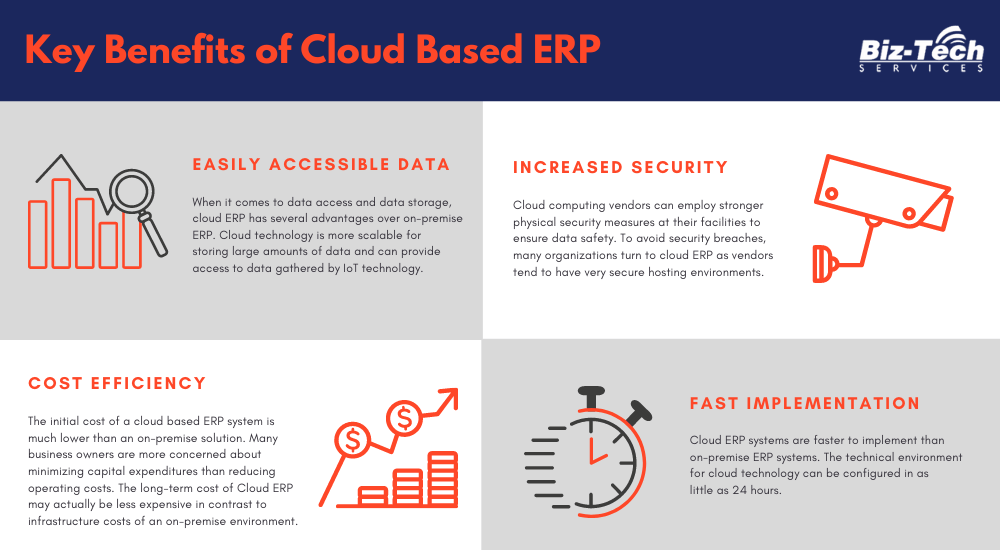
4 Benefits of Cloud Based ERP
Enterprise Resource Planning, known simply as ERP, is management software, usually offered as a bundle of applications that aims to help businesses automate the collection, storage, management and interpretation of data from various sources. With cloud based ERP, business owners and managers can get an integrated real-time view of business processes, resources and commitments.
Cloud based ERP and on-premise ERP each have their own benefits. The best choice for you will depend on your organization’s structure and business strategy. While this post focuses on the benefits of cloud based ERP, it is by no means superior to on-premise ERP. The benefits realized from any technology will depend on project execution before, during and after implementation. Most people probably think, “if it’s the same thing, then why jeopardize security with a cloud based ERP system?” It’s important to keep in mind that cloud ERP systems are extremely secure, and data may actually be far more secure than it would be in an on-premise ERP environment.
One company, who shall remain unnamed, recently discovered that its on-premise ERP servers were no match for a ransomware attack. This attack wiped out all of the company’s data. Hoping to shore up its defenses after the attack, the company upgraded to Acumatica Cloud ERP. Cloud-based ERP solutions are simply a suite of ERP apps delivered to users over the Internet, usually accessed via a browser. The software usually does not need to be installed on computers and is offered on a per-user, per-month, flat-rate fee.

1. Cost Efficiency
Some businesses don’t realize how much running an on-premise ERP system costs. An in-house solution requires the purchase of software, licenses and related hardware to support the system. On top of that, staff needs to maintain the ERP system. This typically drives up the overall budget. The initial cost of a cloud based ERP system is much lower than an on-premise solution. While subscription costs can add up, many business owners are more concerned about minimizing capital expenditures than reducing operating costs. For smaller businesses, the long-term cost of Cloud ERP may actually be less expensive in contrast to infrastructure costs of an on-premise environment.
2. Increased Security
When it comes to physical security of their data and facilities, small to medium sized businesses can only do so much to prevent breaches. But cloud computing vendors can employ stronger physical security measures at their facilities to ensure data safety. To avoid security breaches, many organizations turn to cloud ERP as cloud vendors tend to have very secure hosting environments. Cloud vendors have a lot to lose – with multiple customers, they are popular targets for security breaches. This may sound like a disadvantage, but in many cases, it forces vendors to develop sophisticated security in order to protect business owners.

3. Easily Accessible Data
When it comes to data access and data storage, cloud ERP has several advantages over on-premise ERP. Cloud technology is more scalable for storing large amounts of data and can provide access to data gathered by IoT (Internet of Things) technology. All of an organization’s information and data can be accessed virtually anywhere, as long as there is an internet connection available. Sharing data is easier across locations and departments, and because everyone in the company is interacting with centralized data through a common interface, the likelihood of interpreting the data differently between functions is lessened and opportunity for collaboration is increased.
4. Fast Implementation
Cloud ERP systems are faster to implement than on-premise ERP systems. The technical environment for cloud technology can be configured in as little as 24 hours. This gives organizations more time to focus on the business side of transformation. Change management and business process management require the same time and resources whether cloud or on-premise ERP is being implemented. With cloud based solutions, the provider takes care of hosting.
Bottom Line
The final decision rests with the organization’s management and how they see their future. Do they want to remain contained and in control, or do they want to take advantage of cloud computing power and cloud based solutions? Whichever the case, every successful business requires a healthy and dynamic data ecosystem. Having a reliable and scalable infrastructure in place which can support end-to-end visibility of data flows, fast and secure file transfers, data transformation and storage is integral to success.




